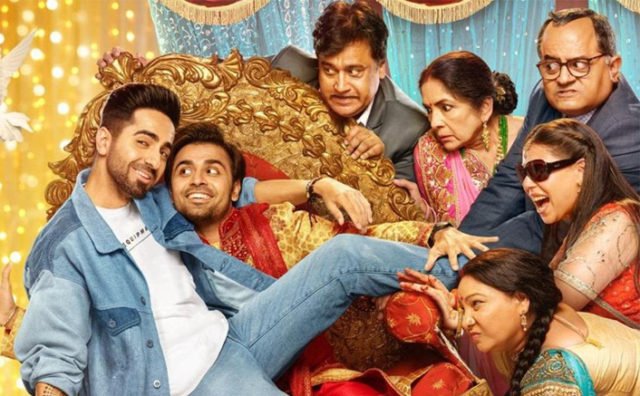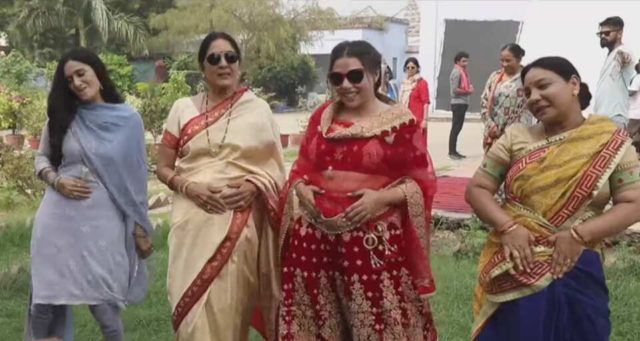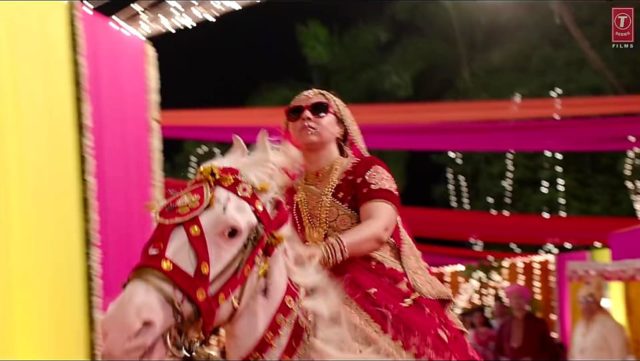By Bhavya Arora
Hitesh Kewalya and team might not have put a grandeur effort in the nomenclature of ‘Shubh Mangal Zyada Saavdhan’ but the script-writing and innovative intertwining of sensitisation with commercialisation of the film is something that is bound to make a strong case to your heart and brain.

Starring the ever brilliant Ayushmann Khurrana and continuing on the legacy of films like Fire (1998), Dostana (2008) and Ek Ladki Ko Dekha To Aisa Laga (2019), the film has made a gigantic effort in normalising the romantic relationships between two consenting adults not conforming to the heterogenous idea of making love.
Aman Tripathi, the love interest of the hero in the film is being played by Jitendra Kumar of Kota Factory. And it goes without saying that their on-screen chemistry could give serious insecurities to some of Bollywood’s straight couples in reel life.
With the Badhaai Ho duo, of Gajraj Rao and Neena Gupta, the comedy territory of the film is in safe hands already. Rajni Tripathi alias Goggle played by Maanvi Gagroo is a delight to watch with her infectious laughter and justified rantings and bickerings.
The beauty with which the post coming out, behind-the-door negotiation with parents has been written and acted upon is an appropriate portrayal of the struggles of not-so-elite queer people.
The character of Gajraj Rao goes the last mile to eliminate the ‘worm’ of queerness from his son’s head which had him puking at the sight of his son stealing a quick kiss from Kartik in the train.
From trying to wash the ‘gay’ness off him with a waterpipe to suicide threats to creatively using the rebirth antics to defy the logic of being born gay, he leaves no stone unturned.
But his scientifically-adept son with arguments like “Aapka oxytocin pyaar, mera oxytocin bimaari” (“Your oxytocin is love, and my oxytocin is a disease”) coupled with the determination of Kartik fuelled by their unfettered love empowers them to stand tall in the face of any physical violence, shaming or wrongful police prosecution inflicted on them.
Read More: Funniest Common Indian Girls You Should Follow On Twitter
The music is mostly a rip off of old Bappi Lahri and Honey Singh songs, hence, not so noticeably great. In fact, the renewed rendition of Jack and Jill’s poem replaced by Jack and Johnny’s struggle is slightly redemptive.
The background score by Karan Kulkarni is interesting in places when he chooses to tone down the violent scene by playing funky tones in the background.

The structure of the film revolves around the making and breaking of the wedding of Goggle (which, by the way, is another commentary on young girls’ marriages with much older men) and the event has been cleverly leveraged to bring out the everyday hassles and family debates of the middle class through frequent breakouts of inheritance fights and unfair power dynamic in the house.
The powerful character of Goggle also leaves no opportunity to exert her individuality and rights in front of family members, be it choosing to arrive at the baaraat riding on the horse, refusing to subscribe to the stone-age notion of girls being paraaya dhan (encumbered property), touching to-be in-laws’ feet or standing up for the love of her brother by facilitating the logistics of the disguised wedding.
Weaving the past love interests of Aman Tripathi’s parents cleverly into the narrative, Hitesh has tried to hint at the staggering set of problems that come with arranged marriages.
The use of black cauliflower as a prop symbolising the brains of so-called educated and acquainted class infected with worms of homophobia, sexism and casteism is simply commendable and never seen before.

The film also takes a subtle dig at everything wrong with the intrusive and protectionist way of Indian parenting carefully peppered with ever-breeding patriarchy.
Thankfully, the film is a first departure from the stereotypical portrayal of gay characters in mainstream Hindi cinema. The humour might have been misplaced sometimes, but the honesty to cause, no way.
The film has tried to engage in an honest conversation with the audience by taking pride in what it is talking about.
Towards the end, when Aman Tripathi tells his mom to closely watch the marriage because many more are down the way, it seems almost as if he is talking to the audience directly, challenging them to be ready for a slew of such movies celebrating non-conformist love stories.
Image Credits: Google Images































